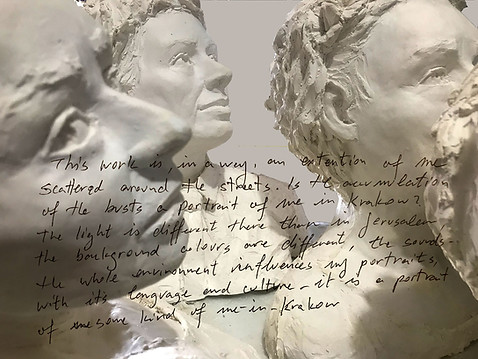
2013, mixed media, 190x~80x~60

2013, mixed media, 190x~80x~60

2013, mixed media, 190x~80x~60

2013, mixed media, 190x~80x~60

I would love it, if you would tell me something about yourself.
How did you find the sculpture?
Have you seen other sculptures
of mine in the streets of Kazimierz?
Are you taking it home with you?
If you do, where will you place it? Would you be so kind as to send me a photo of the sculpture
at your home?

The artist is absent, 2021
A series of self-portraits cast in plaster and scattered in the streets
of the Kazimierz quarter in Krakow, as part of The Jewish Culture Festival

Working on my self-portrait


I look at photographs of myself. I look in the mirror. I touch my face. I am trying to understand what I see. I am trying to look at myself in a different gaze than the one I meet every morning brushing my teeth, putting on mascara, checking my general look, my clothes, my hair. Now I am trying to observe my features as if for the first time, as if they are unknown to me. In a very condensed month I sculpt four self-portraits. It is not easy to pick one image, or even concept, as a single representation of oneself. I have drawn and painted my portrait several times over the years, but I find out that sculpting is completely different. There is an interesting exercise in teaching sculpture in which you are requested to sculpt an ear. You are sure you know what an ear looks like but once you take a good look you note the "slopes" and the weird shapes that form it. To look at my face and try to erase the knowledge I have of the way I look, the shape of my eyes, the size of my nose (not as big as I thought), and what the years marked on my face is fascinating yet complex.

As always I start a sculpture from a block of clay, carving into it searching for the image inside. The general shape of the face begins to form. I start going into smaller details and notice that my face is much narrower than what I made them so I take some clay off. All of a sudden it seems that it's my mother's face. I never thought my cheeks looked like hers, or my eyes, but there she gazes at me, 30 years after she passed.



When working on a self-portrait there is the question of resemblance. Is it important for me that the sculpture will look like me? That people will recognize me in the sculpture? Is it more important to FEEL that it is me? As I think of myself? In the age of selfie, a self-portrait is destined to show oneself as pretty as can be, with a complimentary filter to soften the faults, and in a glimpse of a moment to vanish in the abyss of Instagram. Plaster sculptures, on the other hand, can survive for years. This one moment in time that I perceived myself as in one of these sculptures will survive long after it will become a lie.

I am fond of leaving my works to their uncertain destiny. I have done such actions before, either by making sculptures from unfired clay and leaving them in the field until they crumbled down, or installing a sculpture in a place I knew it can provoke vandalism (which indeed it did), or have a performance in which I let the audience hollow my (clay) sculptures until it collapses.
These are repeated rehearsals
for parting from people,
from things
and a reminder
that I too
am temporary.
PICTURES FROM THE WORK IN KAZIMIERZ, KRAKOW










Curators: Yael Sherill, Lianne Mol & Julia Kawka - Curatorial Collective for Public Art, Berlin
Meydad Eliyahu - curator, HaMiffal art center, Jerusalem : Pawel Kowalewski - programme manager, Jewish Culture Festival, Krakow
